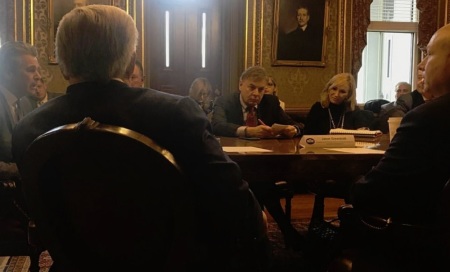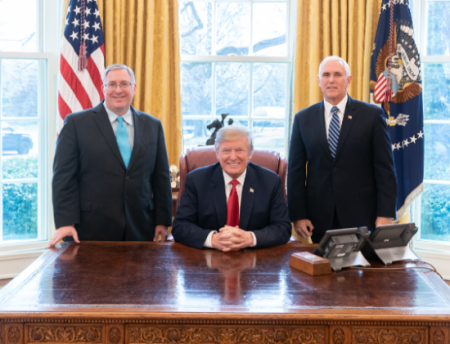Evangelicals voice concerns with Trump's Israeli-Palestinian peace plan at White House

Evangelical leaders gathered last week at the White House to offer their concerns as the Trump administration will soon unveil its Israeli-Palestinian peace proposal that reportedly could give the Palestinians a capital in parts of East Jerusalem.
Last Thursday, a group of conservative evangelical leaders met with Jason Greenblatt, President Donald Trump’s adviser on Israel and special representative for international negotiations, for a “listening session” about what has been coined the “deal of the century.”
Greenblatt is regarded as a chief architect of Trump’s Middle East peace plan along with Trump’s son-in-law, Jared Kushner, and U.S. Ambassador to Israel David Friedman.
During the session, Greenblatt fielded questions and concerns the leaders had with the Middle East peace plan, which is expected to be released in April.
The group of evangelicals, many of whom have interacted informally with the Trump White House in the past, included Pastor John Hagee, the founder of Christians United for Israel; Georgia megachurch pastor Jentezen Franklin; New York Times best-selling author Joel Rosenburg, and Florida pastor Paula White.
“While I’m not at liberty to share what Greenblatt told us, I was encouraged by the conversation and by the Administration’s desire to answer Evangelicals’ questions and address our concerns,” Rosenberg, a dual U.S.-Israeli citizen who has been involved in high-profile meetings with Arab leaders in the past several months, wrote on his blog.
One source who attended the meeting told Axios that several evangelical leaders in the room raised concerns about reports that the plan could include a provision to give Palestine a capital in the Arab neighborhoods of East Jerusalem.
Israeli media had previously reported that the U.S. Israeli-Palestinian peace proposal would provide for a Palestinian state in 85 to 90 percent of the West Bank.
As one of Trump’s most loyal voting bases, white evangelicals are also one of the political demographics most supportive of the state of Israel.
"Our topic of discussion was discussing the forthcoming peace plan concerning Israel. Israel and the Jewish people need our prayers and our advocacy like never before," Hagee says in a video posted to Twitter by CUFI. "The Bible gives the command, 'For Zion's sake, I will not keep silent, and for Jerusalem's sake, I will not keep my peace.' I urge you tonight to pray for the peace of Jerusalem."
Greenblatt reportedly told the group the peace plan will be fair and beneficial to both sides. However, both sides will have to make compromises.

In a blog post, Rosenberg said that following the meeting with Greenblatt, he went on to have a private lunch with Vice President Mike Pence. Later, he would meet with Trump in the Oval Office.
“The VP and I have been friends for many years, going back to his days as a member of Congress. This was our first opportunity to sit down and debrief on the evangelical delegations I led to Saudi Arabia and the United Arab Emirates last fall,” he wrote. “I was glad to be able to share with him what my colleagues and I saw and heard and how this may factor into the prospects for peace in the Middle East.”
Pence asked Rosenberg if he has ever met President Trump. When he Rosenberg said, “No,” Pence said, "Follow me."
“The next thing I knew, the VP led me into the Oval Office and introduced me to America’s Commander-in-Chief,” Rosenberg said. “The President then invited me to sit down with him and the VP around the Resolute Desk, joined by Secretary of State Mike Pompeo and National Security Advisor John Bolton.”
Rosenberg said that it was a fascinating meeting. Rosenberg told the president that he was a “NeverTrumper” until a few days before the 2016 election and went on thank him for fulfilling many of his campaign promises to white evangelicals.
Many commentators have claimed that Trump’s Israel-Palestinian peace proposal is “dead-on-arrival.” The Palestinian envoy to the United Nations even said so himself last year.
Kushner, a senior adviser to his father-in-law, said last month that he hopes people will look at the peace plan with a “fresh perspective” when it is released next month.
“[T]his is the right package of compromises for both sides to take, in order to leave the past behind and try to start a new chapter where there can be tremendous hope and opportunity in the region,” Kushner told Sky News Arabia.
Rosenberg wrote in an op-ed that he believes that the Trump team “could stun everyone” by including provisions that Palestinians would find “too attractive to dismiss.” He believes it could bring the Palestinians “back to the negotiating table despite all their trash talk.”
Last August, Trump contended that the Palestinians will get “something very good” in peace negotiations because of the decision to move the U.S. embassy to Jerusalem. Trump suggested that Israel would have to “pay a higher price” because of the moving of the embassy.
“The Palestinians will get something very good, because it’s their turn next,” Trump said at the time.
As Rosenberg noted, such a prospect is concerning for Israeli leaders. He added, though, that the Trump team may actually be counting on Palestinian leaders to reject the proposal.
“Indeed, it may actually be counting on it and hoping that one Gulf Arab state after another will become so fed up with perennial Palestinian rejectionism that they will decide to finally take bold steps toward full peace with Israel,” Rosenberg wrote.
Follow Samuel Smith on Twitter: @IamSamSmith
or Facebook: SamuelSmithCP





















